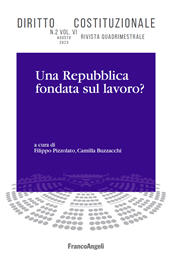L'"esistenza" del lavoratore nella transizione del modello economico : alcune considerazioni giuridiche e lessicali
13-27 p.
L'interesse della dottrina costituzionalistica si è appuntato principalmente intorno al lavoro nella costituzione; molto meno, invece, intorno al lavoratore, pur richiamato da diverse disposizioni costituzionali. Muovendo dal contesto storico in cui la Costituzione ha avuto origine, il contributo, richiamandosi anche a grandi osservatori del Novecento quali Ernst Jünger e George Orwell (ed impiegando dunque euristicamente l'approccio metodologico proprio di Law and literature), tenta di tratteggiare, più che la nozione, la figura costituzionale del "lavoratore". Quest'ultima emerge con nitore in tutta la sua caratura politica e conflittuale: che viene tuttavia messa in crescente discussione dalla transizione del modello economico. [Testo dell'editore].
The interest of constitutional doctrine focused mainly on the concept of work in the constitution. Far less on the concept of "worker", even if it is recalled in several constitutional provisions. Starting from the historical context in which the constitution has its origin, this contribution, recalling also important observers of the XX century like Ernst Jünger and George Orwell (thus using heuristically the methodological approach of Law and literature), tries to outline, rather than the notion, the constitutional figure of the "worker". The latter comes out clearly in its full political and conflictual importance, that is more and more questioned by the transition of the economic model. [Publisher's text].
-
Articoli dello stesso fascicolo (disponibili singolarmente)
-
Informazioni
Codice DOI: 10.3280/DC2023-002002
ISSN: 2611-3376
PAROLE CHIAVE
- Costituzione, Lavoratore, Conflitto politico, Transizione economica, Lessico giuridico, Diritto e letteratura,
- Constitution, worker, political conflict, economic transition, juridical lexicon, Law and Literature


